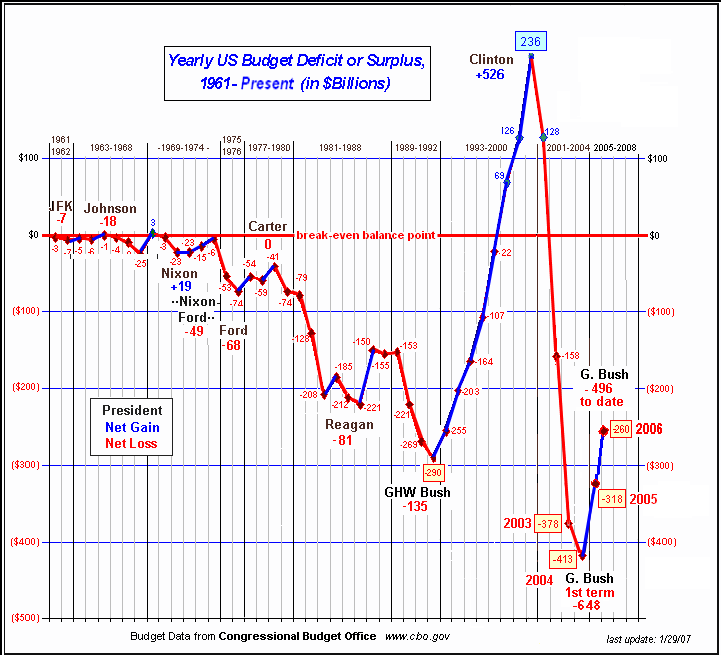Was it the Democrats or the Republicans who achieved “one of the supreme budgetary accomplishments in American history” ?
The Federal Budget of 1993 is one of the greatest and most important stories in modern U.S. political history. The story can be found easily with Google but let me summarize it here anyway. (The budget planned for four years, so dollar figures following need to be divided by 4 to get annual averages.)
At the time of Clinton’s election, the federal debt had grown to alarming proportions. Clinton’s 1993 budget cut spending by $250 billion, perhaps the largest spending cut in all of history. (This was offset by such things as interest on the ever-mounting debt, and $150 billion in new investments.) The 1993 budget achieved a further $250 billion in deficit reduction by raising taxes; the most controversial tax hike was that of the maximum marginal income tax rate (the rate payed by Bill Gates, George Soros, etc.) which was increased from 31% to 39.6%. As high as this might seem, 39% was still less than the rate during most of the Reagan Administration, and certainly less than under Eisenhower, when the rate was 91%.
What were the results of the 1993 budget? The deficit did fall: from $255 billion annually when Clinton took office, to almost nothing in 1997; and by Clinton’s last year there was a surplus of $236 billion. Moreover, from 1993 to 2000 U.S. employment fell from over 7% to 4%; constant-dollar GDP rose by 33% over the same period; and of course stock prices soared.
Contrary to right-wing dogma, U.S. entrepreneurs kept on entrepreneuring (and at an unprecedented rate) despite the 39.6% income tax. The 1993 Budget led directly to one of the most prosperous periods in American history. At the beginning of Clinton’s term, the federal debt was seen as a most important problem; by the end of the term the U.S. Treasury was redeeming its bonds at an unprecedented rate and there was concern that this would cause trouble! (Many contracts were tied to the price of Treasury debt instruments which were disappearing.)
Now who should get credit for the 1993 Budget? Let us review voting on the Omnibus Budget Reconciliation Bill of 1993.
This Bill passed in the U.S. House of Representatives by a vote of 218 to 217. Every single Republican in the House voted against the Bill. The Bill went to the U.S. Senate where the vote was 50-50. Every single Republican Senator voted against the Bill. The Vice President ascended the dais of the Senate chamber and broke the tie; William Jefferson Clinton signed the Bill into Law; the biggest spending cuts in U.S. history were passed; and this budget ushered in an era of prosperity almost unmatched in modern U.S. history. Let me repeat: Not even one single Republican Congressman voted for this Budget. Republicans natter about spending cuts, but on the biggest cut ever, every single Republican stood up and said “Nay”. Of course they would: Raising taxes on the rich (to a level still less than they were under Reagan!) was “class warfare” and would doom America! :smack:
It is said that this was the very first time in all of history that major legislation passed without one single vote from the “opposition” party. Republicans led by Newt Gingrich appeared on TV, predicted a recession, and declared that the Democrats must accept complete responsibility for the consequences of their Budget. As we now know this Budget was central in rejuvenating America’s economy; and America never came remotely close to recession throughout the entire Clinton double term. The Democrats should be proud to accept “complete responsibility” for this.
Perhaps I should apologize for reciting this well-known story at great length … but I’m not sure it is well known. The modern Republican Party stands for nothing if not prevarication, bullshit, hypocrisy and the assumption that the American people want to be fed stupid drivel by commentators preaching to a lowest denominator, so I’m afraid even some Dopers might have been misled.
This thread was provoked by a post in another thread where I asked a Doper who’s probably a “fiscal conservative” to compare the “fiscal conservatism” of Reagan and Clinton. In his response he didn’t mention Reagan, but wrote:
(I’ve left that Doper unnamed, so that he can continue “fighting his own ignorance” anonymously. ![]() )
)
The quotes I’ve found by professional economists all praise Clinton’s 1993 Budget:
[ul][li]“liquidating the deficit ranks as one of the supreme budgetary accomplishments in American history.”[/li][li]“Without question, the 1993 Budget Reconciliation Bill has been remarkably successful in its goal of reducing the federal budget deficit.”[/ul][/li]
Of course the Republicans continued to apply monkey-wrenches to federal budgeting throughout the Clinton years. One instructive lesson about the nature of “Republican leaders” comes from a book by none other than right-winger Tom DeLay:
“Fiscal conservatives” seem to run away and hide when asked to put up facts or shut up. I’m posting this in GQ, though I’m afraid if right-wingers try to rebut it, a Moderator will need to convert it into a Joke Thread. ![]()
